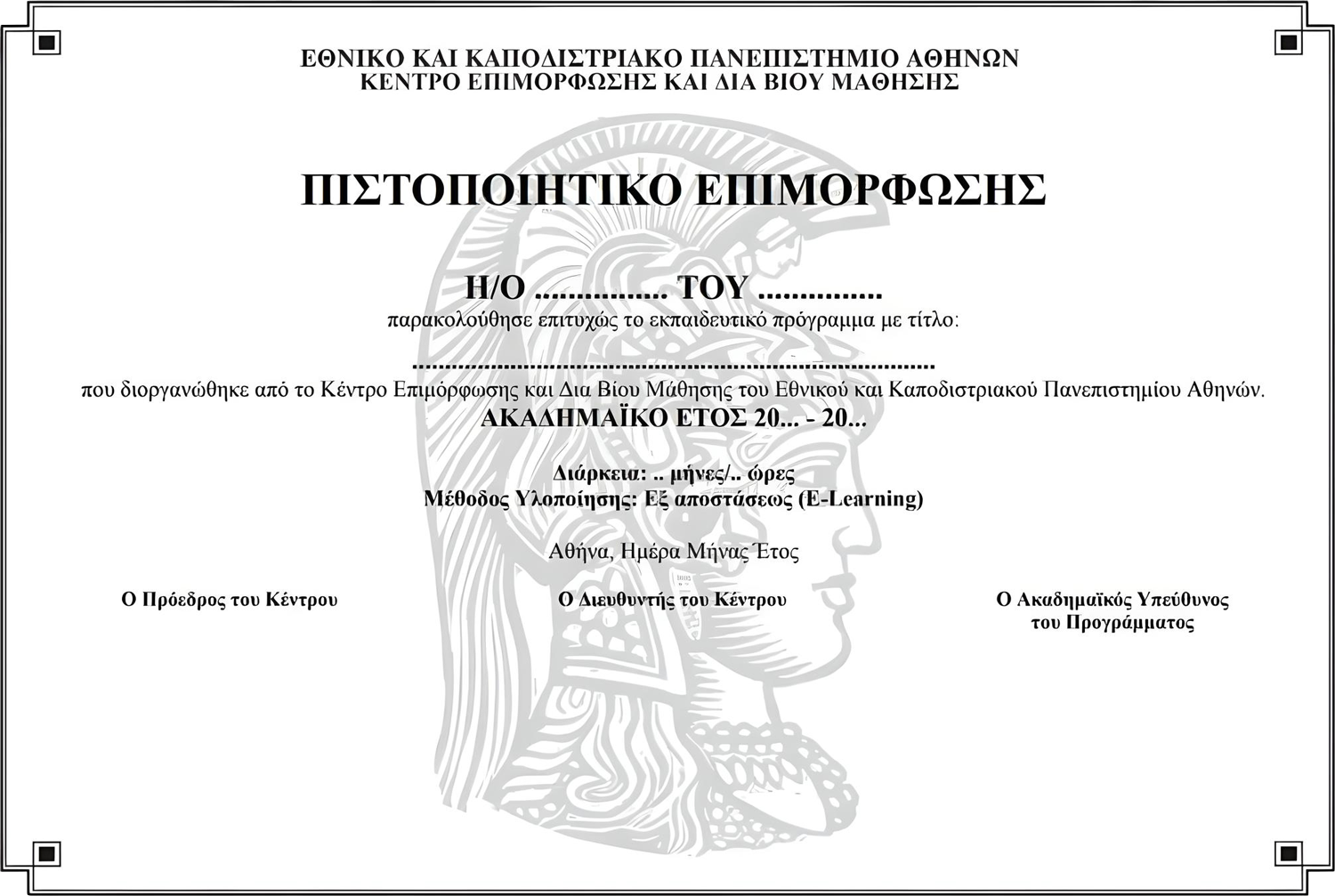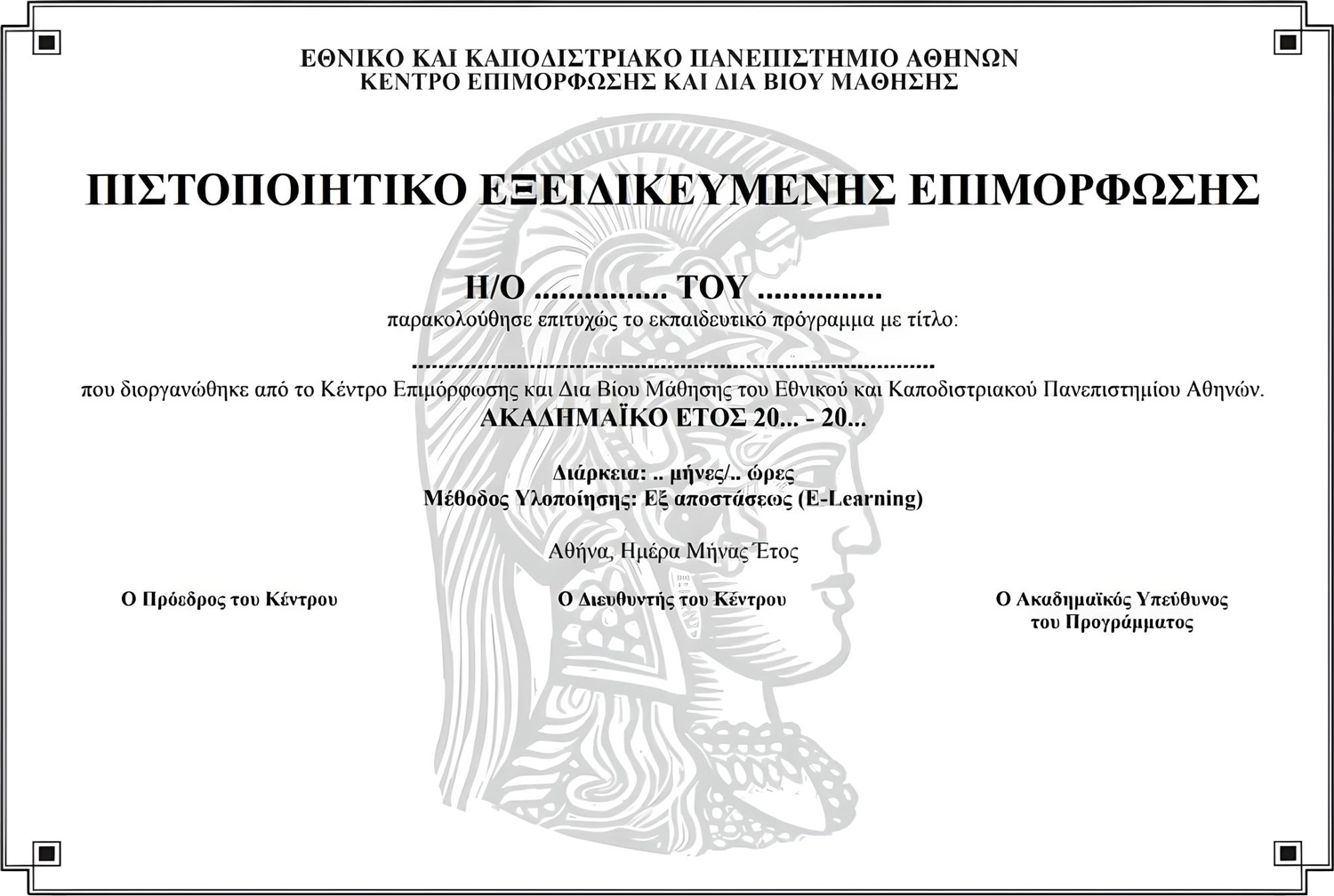Accounting and Finance for Executives
-5% for Early Entry until 8/1/2025
Application until 27 Jan. 2025

-
Mode of Study
Distance Learning
-
Duration
5 Months
-
Credits
16 ECVET
-
Tuition Fees
600€ (without discount)
Program Objectives
The objective of the Accounting and Finance for Executives program is to provide participants with theoretical and practical training in accounting and finance while enhancing their managerial and leadership skills, enabling them to meet the demands of the modern business environment.
The program aims to equip learners with essential knowledge to identify, analyze, and develop solutions to financial and accounting issues faced by private and public enterprises and organizations.
Participants will begin with an introduction to accounting and finance, followed by an in-depth study of financial statements, accounting books, inventory execution, and the closing of the accounting year.
They will also explore financial statement analysis, risk and return assessment, capital cost evaluation, and money and capital markets.
Finally, they will learn to evaluate investment projects and study modern portfolio theory.
Training Cycle Calendar
-
27/1/2025
Application Deadline
-
30/2/2025
Program Start Date
-
4/2025
Certificate Award
During Christmas, Easter, and the month of August, the Executive Program is temporarily suspended.
Who Should Attend
The Accounting and Finance for Executives Executive Program is designed for professionals who wish to expand their knowledge and expertise in accounting and finance, organize and update their skills, and improve their career prospects.
Skills You Will Gain
Upon completing the Accounting and Finance for Executives program, participants will gain multiple benefits. Graduates will be able to:
Describe the structure of corporate financial statements.
Gather and interpret financial data related to businesses.
Summarize the key determinants of a company’s capital structure.
Justify the importance of assessing risk when undertaking an investment.
Identify the factors influencing financial and accounting decisions in a company.
Recognize the complexity and interdependence of financial issues.
Explain the fundamental functions of accounting and finance.
Demonstrate how to calculate the Net Present Value (NPV) of an investment project.
Differentiate between various sources of capital and their impact on a company’s value.
Analyze a company’s financial statements effectively.
Course Modules
Total Duration: 5 Months Teaching Hours: 400
Introduction to Accounting and Finance
2 WeeksFundamental concepts of accounting and finance
Importance of financial reporting
Basic Accounting Principles
Financial system
Time value of money
Financial Statements and Their Content
2 WeeksPurpose and significance of financial statements
Preparation of the balance sheet
Income statement analysis
Statement of retained earnings
Cash flow statement
Statement of changes in equity
Accounting Procedures and Books – Introduction to Double-Entry Accounting
2 WeeksAccounting cycle and books
Functionality of ledger accounts
Trial balance preparation
Accounting errors and their correction
Introduction to Inventory and Closing Procedures
2 WeeksInventory execution and adjustment entries
Profit and loss determination
Closing of the accounting period
Financial Statement Analysis
2 WeeksStakeholders and the importance of financial statement analysis
Methods of financial statement analysis: horizontal (trend), vertical (common size), and ratio analysis
Liquidity, activity, solvency, profitability, and investment ratios
Working capital management
Break-even point calculation
Return and Risk
2 WeeksKey components of return
Sources of financial risk
Estimation of return and risk
Cost of Capital
2 WeeksCore concepts of corporate cost of capital
Cost of debt financing
Cost of equity financing
Weighted Average Cost of Capital (WACC)
Money and Capital Markets – Security Valuation
2 WeeksMoney market instruments
Capital market instruments
Bond valuation
Relationship between interest rates and bond prices
Cash Flows and Investment Evaluation
2 WeeksInvestment project evaluation methods
Payback period method
Net Present Value (NPV) method
Internal Rate of Return (IRR) method
Modern Portfolio Theory
2 WeeksExpected return and risk of a portfolio
Efficient portfolios
Single-index model
Systematic and unsystematic risk
Asset pricing model
Discount Categories
-
Category A – 10% Discount
Unemployed individuals
Persons with disabilities
Employees of universities and research centers
Groups of three or more participants from the same organization
-
Category B – 5% Discount
Early registration up to one month before the application deadline
Full tuition payment before the program start date
Please note that the above discount categories cannot be combined. If a participant qualifies for both categories, only the higher discount will be applied.
Certificate
Successful completion of the program leads to the award of a certificate, which includes the program title and the exact number of training hours. Depending on the program, the awarded certificate may be:
Europass / ECVET Certificate Supplement
The Europass / ECVET Certificate Supplement is a document that accompanies the training or specialized training certificate awarded upon program completion.
It provides a detailed description of the training program, including the course modules, duration, admission requirements, assessment process, learning outcomes, and the skills and competencies acquired.
It enhances the value of the awarded training or specialized training certificate and can be used by graduates for employment opportunities, career advancement, or further studies.
Methodology
-
Training Method
Distance learning (e-learning) through an interactive platform.
-
Platform Features
User-friendly, includes e-books, interactive content, multimedia, self-assessment, and livestreaming.
-
Structure
Learning modules with study guidelines.
-
Content
Objectives, outcomes, keywords, introduction, main text, examples, case studies, exercises, audiovisual material, slides, summary.
-
Support
Continuous communication and livestream meetings with instructors.
-
Assessment
Self-assessment, exercises, and final evaluation with multiple-choice questions and the option for retaking.
Contact
-
210 368 9430
Executive Programs Secretariat, Monday to Friday (11:00 – 17:00)
-
executive-programs@econ.uoa.gr
Contact via email
-
Sofokleous 1 Street
Executive Programs Secretariat, Monday to Friday, 11:00 – 17:00, at Grypareion Megaron, Sofokleous 1, 5th floor, Office 518, Athens, Postal Code 10559


